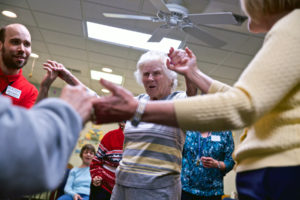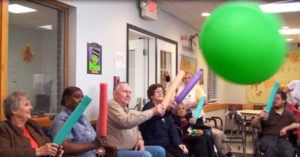For UCC-related St. John’s Community Care, Financial Realities Yield Difficult Choices, Renewed Direction for the Future

St. John’s Community Care Adult Day clients dance to their favorite tunes.
When UCC-related St. John’s Community Care started its Home Services Program 34 years ago, it filled an important niche — providing services to older adults in the community who had no means of getting the care they needed. But over time, communities change. For the Collinsville, Ill., CHHSM member, this meant competition with 19 other home care organizations for caregivers and clients. So this past May, St. John’s board made the difficult decision to shift resources supporting its Home Services Program to programs that meet the needs of families living with dementia and other memory-loss issues.
Begun in 1985 by St. John UCC in Collinsville, St. John’s Community Care originally focused its ministry on serving home-bound church and community members. Services have expanded to include the entire Metro East region of southern Illinois. Today, St. John’s Community Care has two Adult Day Program centers, and recognized programs in caregiver support, classes for individuals with early memory loss, and training for families living with dementia, among other offerings.
Over the past several years, the Home Services Program became financially insolvent, due primarily to difficulty hiring staff, says Nancy Berry, executive director. Though board and staff worked hard to develop new ways to attract employees and clients, the situation did not improve. So the program will close Oct. 1, giving St. John’s the means to increase and improve its other services.
Additionally, “we were serving very few low-income clients through state-funded programs,” says Berry. “The majority of our home services clients were private pay and were in a position to engage others to meet their needs.”
Finding enough qualified staff was the biggest problem. With a lower unemployment rate, there are fewer candidates to go around. “Competitors with national advertising have undoubtedly been part of the dynamic,” Berry says, “but I really think the bigger reason is the shifting demographics. Pundits have been predicting that our nation soon will face a larger shortage of individuals in caregiving roles — including nurses and physicians — in part because of the large number of baby boomers and smaller number of younger people.”
During the program closure process, St. John’s helped home service clients and employees explore other options. “An important piece of this process was our decision in May to develop a timetable for notifying affected parties of our closure by Oct. 1,” Berry adds. “I believe we managed to announce the change so that no one affected directly or with a close connection to our ministries learned of the decision second hand. We also gave everyone enough time to adjust to the reality and take the steps they need to take.”

Another popular Adult Day activity is noodle volleyball.
With the improved financial position due to closing the Home Services Program, plus new grant funding for family support and training and a pending increase in state fees for adult day care, St. John’s moves into the future excited about its larger focus in other areas of service.
“We can focus on using our expertise to make living with dementia easier for both the individuals with that condition and the families who are essential to keep them safe and living their best possible lives,” Berry says. “Social isolation is being recognized as a detriment to health, so we are adding options like ‘Memory Cafes’ to our services menu.” Memory Cafes are led by memory loss professionals and provide opportunities for people with memory problems to participate in a morning of conversation and activities.
Another key emphasis is St. John’s “Brain Wave” Early Memory Loss Program. Early Memory Loss (EML) refers to a set of cognitive conditions that may affect people who could benefit from the Brain Wave program. Two of the most common conditions that produce early memory loss are Mild Cognitive Impairment and early-stage dementia. Individuals with Mild Cognitive Impairments (MCI) have cognitive problems that exceed what is expected for their age and background but are not severe enough to warrant a dementia diagnosis. Most persons with MCI function well in familiar everyday activities and are usually aware of, and often worried about, their cognitive changes. Brain Wave facilitators identify goals for participants and help them achieve those goals.
Berry also hopes to increase St. John’s Adult Day efforts. A new day care site is in the long-range plans. “We also are being approached to facilitate support groups for assisted living and memory care facilities, and to do dementia care training for a variety of service providers whom Illinois recently notified of new education and training requirements,” she says.
As Berry reflects on the 34-year history of St. John’s Community Care, she sees the continual change and growth that has led to its current ministries. “When we founded St. John’s Community Care in 1985, our vision did not extend much beyond making life easier for a few seniors in our community, which we did,” she says. “As we gained experience and recognized additional needs, we were able to develop the skills and resources to meet some of them — primarily needs related to memory care.”
Berry adds, “Without colleagues and members who have devoted time, talent and treasure to leading and supporting our ministries, we would have remained a small, part-time effort to care for a few neighbors. Had my board and I been presented early on with all the needs we now address, I believe we would have been overwhelmed. Looking back, I see God’s hand in preparing us for each step we’ve taken.”
Join Our Mailing LIst
Follow on Facebook
Iredell Adult Day Services Hosts Ribbon-Cutting to Celebrate Adult Day Health Certification - CHHSM
www.chhsm.org
Iredell Adult Day Services (IADS) in Newton, N.C. — a nonprofit organization dedicated to caring for older adults, vulnerable groups, and their families, and part of EveryAge — hosted a ribbon cut...